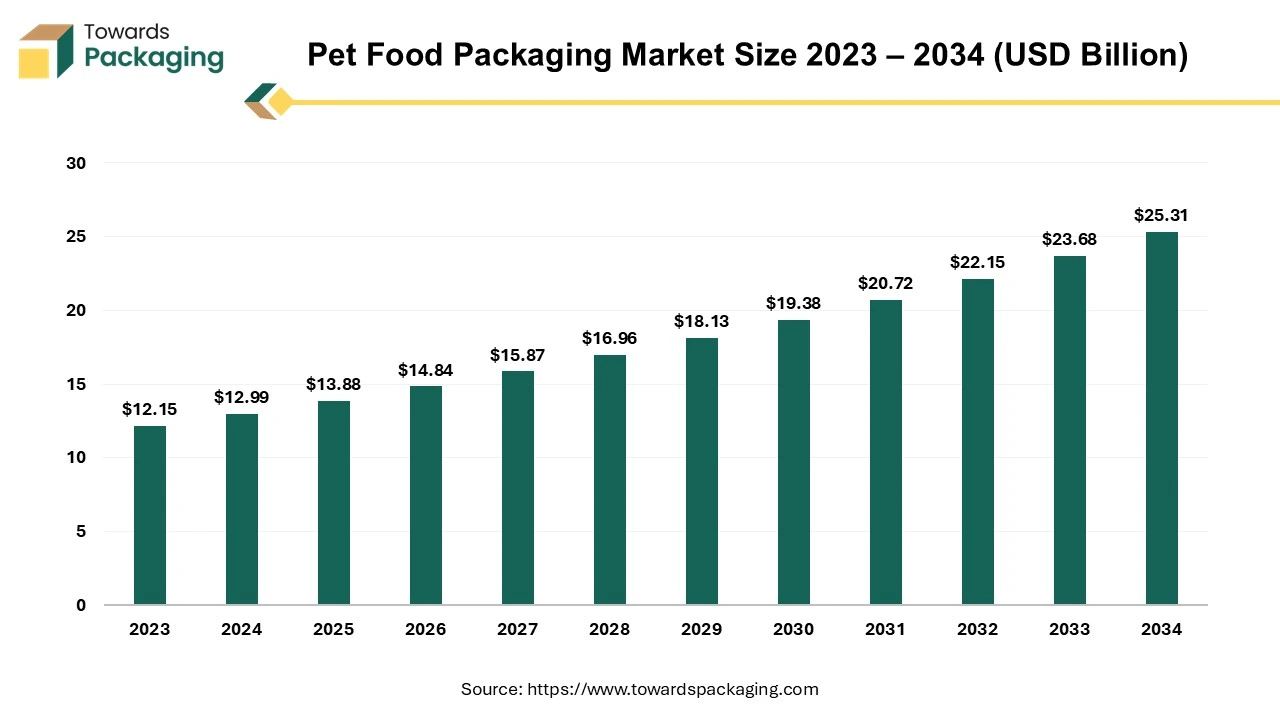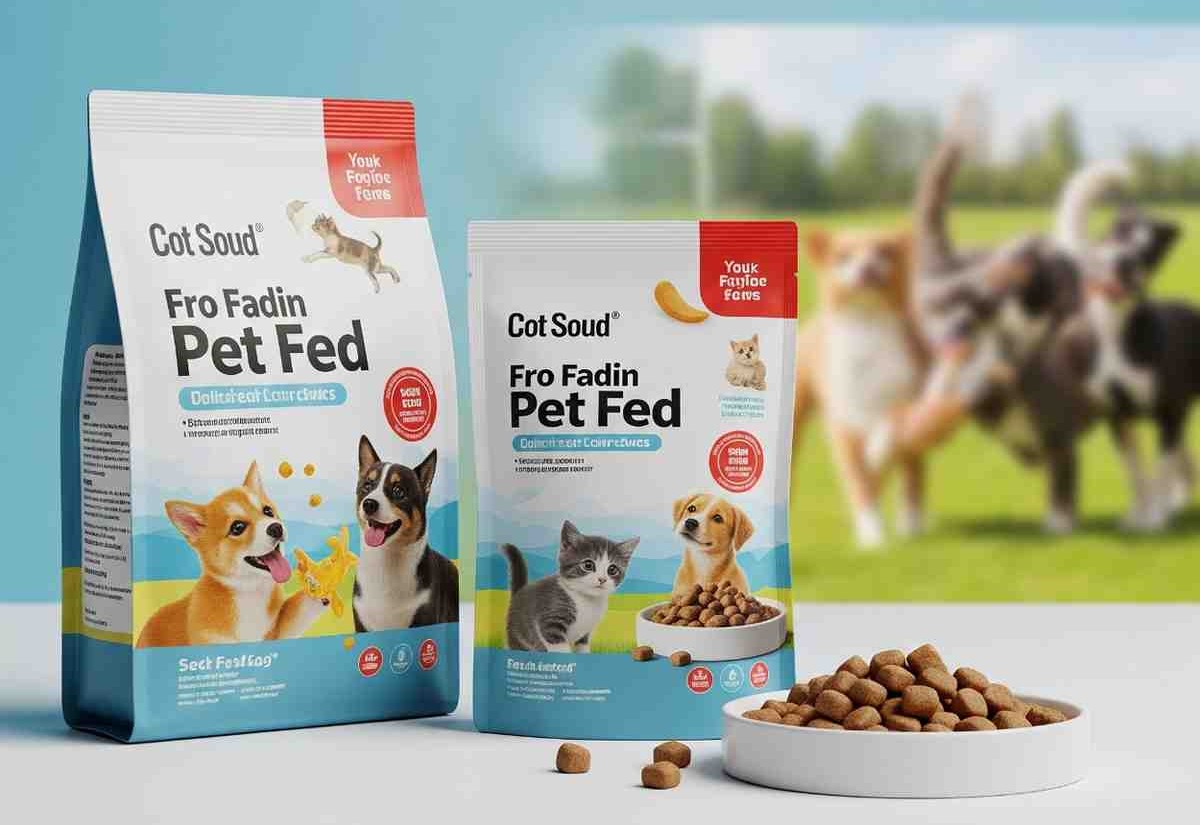The global pet food packaging market is projected to grow from USD 13.88 billion in 2025 to USD 25.31 billion by 2034, registering a compound annual growth rate (CAGR) of 6.9%. This growth is fueled by rising consumer demand for convenient, sustainable, and smart packaging solutions that emphasize both functionality and visual appeal.
As pet ownership surges and pets are increasingly treated as family members, packaging is becoming a central tool for ensuring product safety, conveying critical information, and influencing purchasing decisions.

Role and Importance of Pet Food Packaging
Pet food packaging does more than contain products—it plays a crucial role in preserving nutritional value, extending shelf life, and offering fact-based, legally required labeling. Consumers rely on packaging to make informed decisions about their pets’ diets.
Packaging formats such as pouches, cans, bags, and trays are designed to meet varying food types and user preferences. Materials used—ranging from paper to plastic and aluminum—are selected based on preservation needs, hygiene standards, and sustainability goals.
Invest in Our Premium Strategic Solution: https://www.towardspackaging.com/download-databook/5065
Premiumization and Customization
With pets viewed increasingly as family members, the premium pet food segment is booming. This shift has given rise to luxurious, high-quality packaging, creating demand for:
-
High-end graphics and design
-
Personalization for portion control or dietary needs
-
Transparency around ingredient sourcing
This evolution has led to an explosion in product variety and SKU proliferation, prompting brands to differentiate through visually compelling and functional packaging.
Smart and Sustainable Innovations
Flexible Packaging on the Rise
Flexible packaging is gaining traction due to its ability to:
-
Preserve freshness
-
Reduce environmental footprint
-
Offer resealable, portable, and space-saving features
Companies like FoxPak and Mondi are advancing recyclable flexible solutions, while innovations like ProAmpac’s PRO-EVO Recyclable demonstrate the shift toward paper-based and curbside-recyclable materials.
Get All the Details in Our Solutions – Access Report Preview: https://www.towardspackaging.com/download-sample/5065
AI and Smart Features
Artificial Intelligence is transforming packaging development, optimizing:
-
Supply chain tracking with RFID and QR codes
-
Personalization using data-driven insights
-
Quality assurance through predictive analytics
Smart packaging contributes to brand loyalty by offering real-time freshness indicators and digital engagement opportunities.
Regulatory Compliance and Safety
U.S. regulations like the Food Safety Modernization Act (FSMA) have heightened the need for packaging that promotes transparency and safety. Features such as clear windows for product visibility and clean labeling support consumers’ desire for authenticity and traceability.
Pandemic Impact and Pet Adoption Surge
COVID-19 caused temporary disruptions in the packaging supply chain but also triggered a spike in pet adoptions, notably in countries like India. Initiatives promoting the adoption of stray animals helped reinforce long-term demand for pet food and packaging solutions tailored to evolving consumer expectations.
If you have any questions, please feel free to contact us at sales@towardspackaging.com
India’s Evolving Pet Food Landscape
India presents a unique challenge and opportunity. Although packaged dog food penetration remains relatively low at 11–13%, the growing middle class and urbanization are shifting preferences.
Dominant players like Mars International (Pedigree, Eukanuba) lead the market, while newer entrants such as Purina, N&D, and Hill’s Science are making inroads. Packaging innovations will play a critical role in winning consumer trust and expanding reach.
E-Commerce Influence
The e-commerce boom—accelerated by the pandemic—has reshaped how pet food is sold and delivered. Companies like Chewy, Zooplus, and Mars Petcare have invested in direct-to-consumer platforms, which demand durable, lightweight, and visually engaging packaging optimized for shipping.
Consumer Trends and Expectations
Environmental Consciousness
A growing number of pet owners prioritize sustainability. Research shows:
-
Over 60% of pet owners are willing to pay more for eco-friendly packaging.
-
78% would switch brands if another offers more sustainable packaging.
-
However, many still find sustainability claims confusing or unclear.
Brands can stand out by providing transparent messaging, using certifications and tools like Amcor’s ASSET lifecycle assessment to communicate environmental impact credibly.
Design and Aesthetics
The packaging must cater to millennial and Gen Z buyers who seek:
-
Vibrant, interactive designs
-
Ingredient transparency and clean labeling
-
Personalization that matches their pet’s lifestyle and nutritional needs
Challenges for Packaging Professionals
Despite consumer enthusiasm, packaging manufacturers face real challenges:
-
High costs of sustainable materials
-
Quality control and material performance concerns
-
Balancing environmental goals with regulatory standards
The gap between what consumers want and what’s feasible continues to challenge the industry. Still, ongoing innovations suggest a promising path forward.
Recent Developments
-
Wyse Products (June 2025): Launched Total Pet Kitchen, a countertop appliance for making fresh pet food at home.
-
Mondi and Saga Nutrition (June 2025): Developed mono-material recyclable packaging for dry food.
-
Uflex (April 2025): Announced a facility in Mexico to manufacture woven polypropylene bags.
-
Calysta and Marsapet (February 2025): Created FeedKind Pet, a dog food with a novel cultured protein.
-
ProAmpac (2023): Launched ProActive Recyclable® R-2050 and PRO-EVO Recyclable, offering certified recyclable options.
Conclusion
The pet food packaging market is undergoing rapid transformation. As consumers become more eco-conscious and view pets as family members, the demand for smart, sustainable, and visually compelling packaging will only grow. Companies that can navigate technical challenges while aligning with evolving social values stand to gain the most in this dynamic, fast-growing market.
Source : https://www.towardspackaging.com/insights/pet-food-packaging-market


